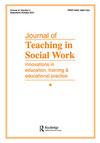我们感觉,因此,我们学习:多样性和社会公正中情感领域的评估研究生社会工作课程
IF 0.8
Q3 EDUCATION & EDUCATIONAL RESEARCH
引用次数: 0
摘要
摘要在社会工作教育中,关于情感学习过程的文献在很大程度上是概念化的,研究很少。激发学生价值观、信仰和情绪的情感过程是支持学生发展自我反思技能、对不适的耐力以及对与自己身份不同的人的好奇心的宝贵资源。本研究使用美国全国范围的教学大纲样本,衡量了Krathwohl及其同事的情感领域在多大程度上被纳入与MSW多样性相关的社会正义教学大纲。使用48个音节的内容分析来分析(A1)接受、(A2)回应、(A3)评价、(A4)组织和(A5)表征水平的情感领域。研究结果为区分情感学习的水平以及如何在与多样性相关的社会正义的整个教学大纲中实施情感学习提供了一个模型本文章由计算机程序翻译,如有差异,请以英文原文为准。
We Feel, Therefore, We Learn: Assessment of Affective Domains in Diversity and Social Justice Graduate Social Work Syllabi
ABSTRACT Within social work education, the literature on affective learning processes is, for the most part, poorly conceptualized and minimally researched. Affective processes that engage students’ values, beliefs, and emotions are valuable resources supporting students’ development of self-reflection skills, stamina for discomfort, and curiosity for people who hold identities that differ from their own. Using a nationwide sample of syllabi in the United States, this study measures the extent to which the Krathwohl and colleagues' affective domains are incorporated into MSW diversity-related social justice syllabi. Content analysis of 48 syllabi was used to analyze affective domains at the levels of (A1) Receiving, (A2) Responding, (A3) Valuing, (A4) Organization, and (A5) Characterization. Findings provide a model for differentiating the levels of affective learning and how they can be operationalized throughout the syllabus within diversity-related social justice
求助全文
通过发布文献求助,成功后即可免费获取论文全文。
去求助
来源期刊

Journal of Teaching in Social Work
EDUCATION & EDUCATIONAL RESEARCH-
CiteScore
1.20
自引率
0.00%
发文量
36
期刊介绍:
The Journal of Teaching in Social Work fills a long-standing gap in the social work literature by providing opportunities for creative and able teachers—in schools, agency-based training programs, and direct practice—to share with their colleagues what experience and systematic study has taught them about successful teaching. Through articles focusing on the teacher, the teaching process, and new contexts of teaching, the journal is an essential forum for teaching and learning processes and the factors affecting their quality. The journal recognizes that all social work practitioners who wish to teach (whatever their specialty) should know the philosophies of teaching and learning as well as educational methods and techniques.
 求助内容:
求助内容: 应助结果提醒方式:
应助结果提醒方式:


